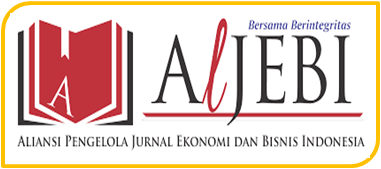DETERMINAN TINGKAT KONSUMSI SANTRI KELAS 6 PONDOK MODERN DARUSSALAM GONTOR KAMPUS 2
Abstract
The one indicator of economic stability in the pondok modern Darussalam Gontor environment is level of consumption. The purpose of this study was to determine the effect of income and lifestyle on the level of consumption of students of class 6 Pondok Modern Darussalam Gontor campus 2. Data analysis method used in this study is a multiple linear regression analysis method. The results of this study indicate that there is a positive relationship between income and consumption, which is the increase in income, the higher the level of consumption. And there is also a positive relationship between lifestyle and consumption, namely the more lifestyle increases, the higher the level of consumption. The results of this study also obtained that there is a very strong relationship between income and lifestyle towards consumption
Keywords
Full Text:
PDFReferences
Amstrong, Gary & Kotler. (2002) Dasar-Dasar Pemasaran. Jakarta: Prenhalindo.
Antonio, M Syafi'i. (2001). Bank syariah dari Teorika Praktek. Jakarta:
Gema Insani Press.
Arsyad, Lincolin. (2008). Ekonomi Manajerial. Yogyakarta: PBEF-Yogyakarta.
Assael, H. (1984). Consumer Behavior and Marketing Action. Boston:
Kent Publishing Company.
Azis, Muhammad Abdul. (2009). Analisis Faktor-faktor Yang Mempengaruhi Konsumsi Masyarakat di Provinsi Jawa Tengah Tahun
-2007. Surakarta: Universitas Selebes Maret.
Chamid, Nur. (2010). Jejak Langkah Sejarah Pemikiran Ekonomi Islam. Yogyakarta: Pustaka Pelajar.
Chapra, Umer. (2001). Masa Depan Ilmu Ekonomi. Jakarta: Gema Insani Press.
Ependi. (2013). Pengaruh Pendapatan dan Gaya Hidup Terhadap Perilaku Konsumsi Masyarakat. Bandung: Universitas Pendidikan Indonesia.
Gordon, R., Gurrieri, L., & Chapman, M. (2015). Broadening an Understanding of Problem Gambling: The Lifestyle Consumption Community of Sport Betting. Journal of Business Research , 2164-2172.
Indonesia, I. A. (2009). Standar Akuntansi Keuangan. Jakarta: Salemba Empat.
Khozanah, Ummi. (2014). Analisis Faktor-Faktor Yang Mempengaruhi Pola Konsumsi Dalam Pandangan Islam (Survei Pada Pengurus dan Anggota Asbisindo di Jawa Barat). Bandung: Universitas Pendidikan Indonesia.
Kotler, P. (2002). Manajemen Pemasaran: Edisi Milenium. Jakarta: PT. Prehalindo.
Kusnadi, Maria, S., & Irmadariyani, R. (2000). Akuntansi Keuangan Menengah: Prinsip, Prosedur, dan Metode. Jakarta: Salemba Empat.
Li, J., Wu, Y., & Xiao, J.J. (2019). The Impact of Digital Finance on Household Consumption: Evidence From China. Economic Modelling Journal.
Mowen, J. C., & Minor, M. (2002). Perilaku Konsumen. Jakarta: Erlangga.
Rasyidi, Suherman. (1998). Pengantar Teori Ekonomi: Pendekatan Kepada Teori Ekonomi Mikro dan Makro. Jakarta: PT. Raja Grafindo.
Son, P. S., & William, D. N. H. (1993). Ekonomi, Jilid. 1. Jakarta: Erlangga.
Sugiyono. (2007). Metode Penelitian Bisnis. Jakarta: Gramedia.
Tuanakota, T. M. (2000). Teori Akuntansi. Jakarta: Salemba Empat.
Wahab, H. Abdul. (2012). Pengantar Ekonomi Makro. Cetakan I. Makassar: Alauddin University Press.
DOI: https://doi.org/10.18860/ed.v7i2.7341
Refbacks
- There are currently no refbacks.
Editorial Office:
Megawati Soekarnoputri Building
Faculty of Economics
E-mail: eldinar@uin-malang.ac.id
Universitas Islam Negeri Maulana Malik Ibrahim Malang
E-ISSN 2622-0083

El Dinar under a CC BY SA 4.0 International License.
Member of:
Indexed By:
















